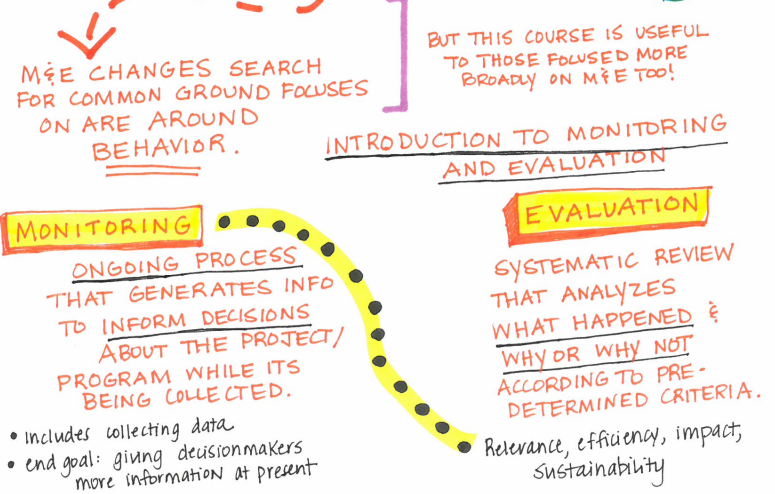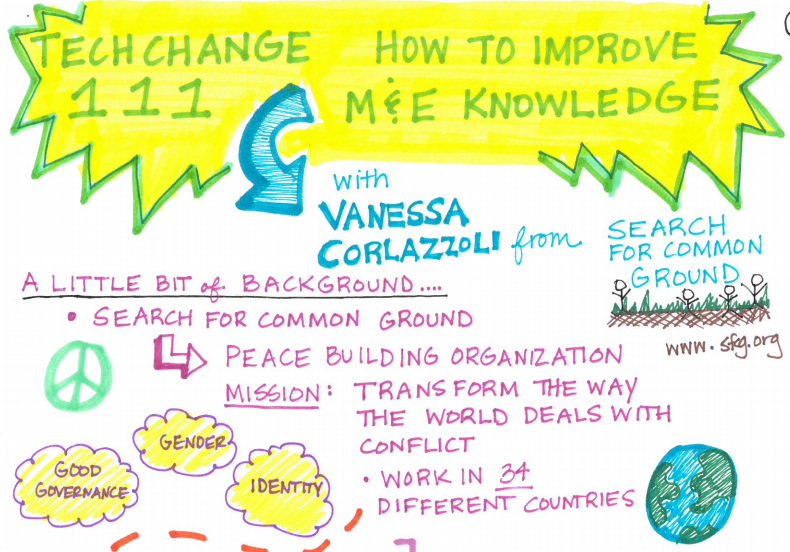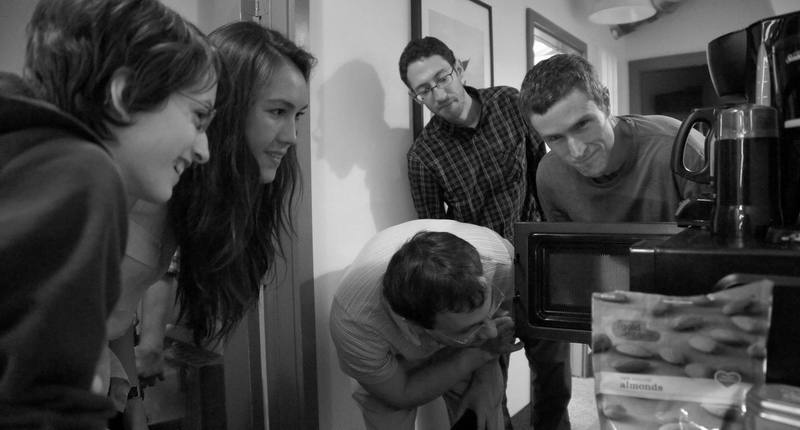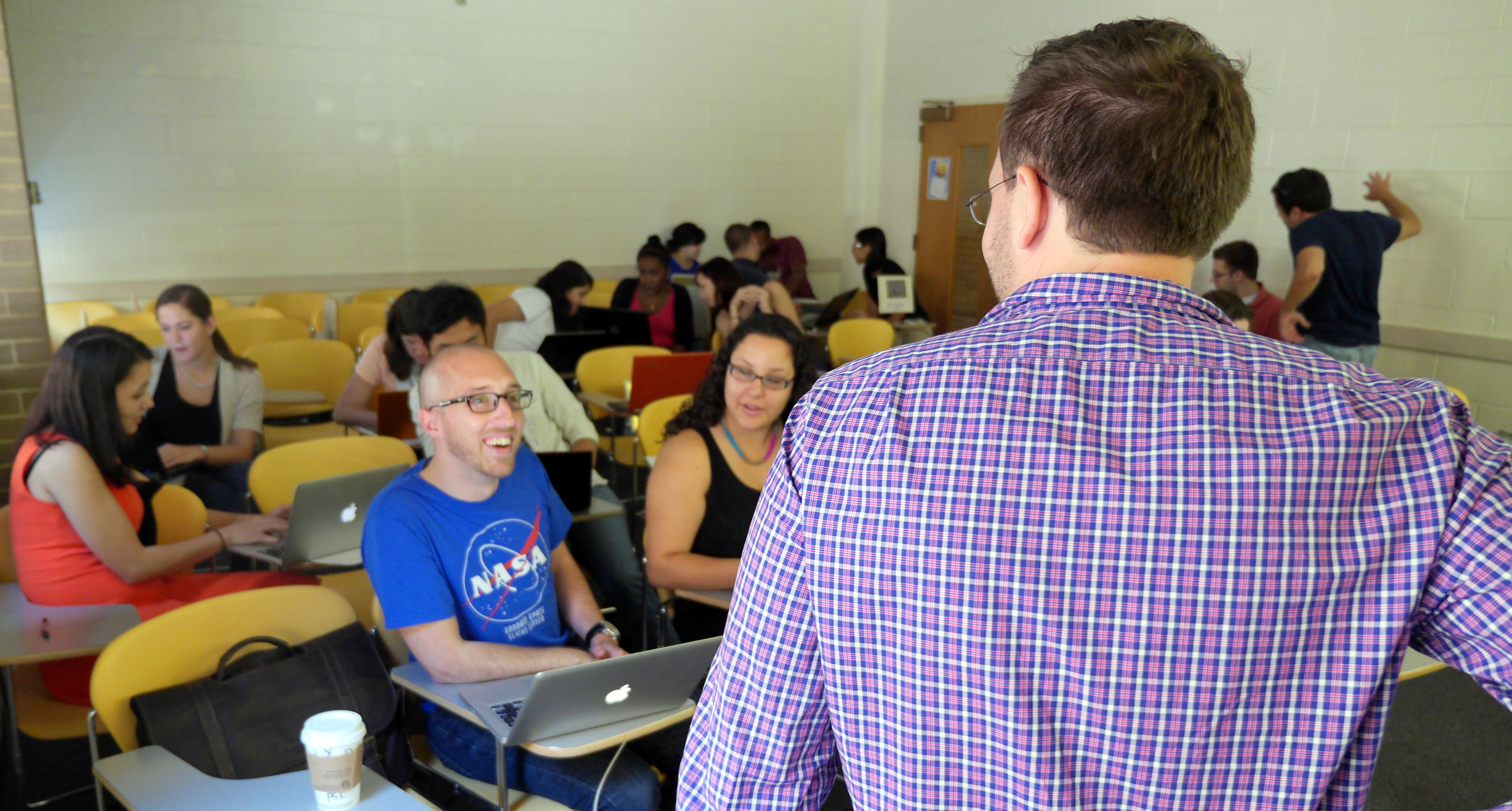As an online learning community, we are always looking for ways our students can learn more effectively. Many of our amazing alumni, who take our online courses on top of their full-time jobs, have used what they learned in our courses to accelerate their careers, or successfully launch or complete various projects. But we seldom see how our students are learning. We came across the work of Katherine Haugh in our twitter feed when she posted a picture of her graphic notes for our on – demand course on Mobile Data Solutions.
Since these notes have been helpful for Katherine, we wanted to make them available for the TechChange community, we are excited to have Katherine help us as our graphic facilitator for some of our live events in our upcoming courses. She already took notes for one of our live sessions with guest expert, Vanessa Corlazzoli of Search for Common Ground in our Tech for M&E online course.

Some of Katherine’s notes for our guest expert session with Vanessa Corlazzoli in our Tech for M&E online course
Since taking notes by hand is found to be more beneficial than taking notes on the computer, we sat down with Katherine to learn more about her note taking strategies and any tips she has for those of us who would like to get started.
How did you hear about TechChange?
I heard about TechChange through Twitter. I am new to the M&E field, so I am constantly looking for online courses that relate to evaluation, especially ones that focus on combining technology and international development initiatives.
How long have you been taking notes by hand?
I have been taking notes by hand since I was in the fifth grade. In middle school, I took all of my notes by hand and always carried a bag of multi-colored pens around with me. What I like most about note-taking is being able to use my notes as a learning or discussion tool (for myself and others). When I was in college, I worked as a note-taker through the McBurney Disability Resource Center at the University of Wisconsin-Madison. I worked as a notetaker for a variety of courses–from Microeconomics to Global Health and Poverty–and I loved it. (Not to mention, I was being paid to attend my own classes. It’s hard to beat that!). Drawing out historical events or evaluation plans helps me to visualize and better understand what I am thinking and also allows me to share my ideas and thoughts with others in a concise and creative way. I enjoy taking extremely complicated issues or concepts and making them simple and easily digestible.
Why handwritten note taking? What are the pros and cons?
Many of my friends and professors asked me this same question. There are countless pros to taking notes by hand:
- You understand better. It requires that you understand and think through what you are writing because everything you do is intentional when you takes notes by hand.
- You have more control over the style and layout of your notes. There is more room for creative expression.
- It forces you to learn as you write — which is the main purpose of taking notes.
The major downsides to taking notes are hand cramps (yes, this is a thing) and not being able to catch every word, detail or concept. You have to work speedily and you run the risk of missing some points.
However, if you are able to capture the major points (for yourself to remember later or to relay to others) you’ve done your job.
What are some of your strategies to take great notes?
The three important strategies I suggest are:
- Find the right mix for you (and your audience): For me, writing on a white paper with enough text and symbols works the best. Remember to keep the notes short, and have triggers in key words, images, or symbols to help jog your memory when looking them over.
- Get the right tools: Try out different options to know what works best, I like using darker base colors, and bright colors to highlight main points.
- Make it personal: Write notes in your own words, I also include dorky jokes in my notes to help me recall what I wrote.
What is your advice for people who want to get started with note taking?
Just give it a go! You’ll be surprised by how easy it is and remember, you don’t have to be an artist to be a brilliant note-taker. Take a concept that you know very well and try to draw it out. It could be in list format or with pictures–whatever makes the most sense to you!
If you want to start taking beautiful notes but can’t stay away from tech, you can also use MindManager as one of our other alumni, Daniel Acosta did in our previous Tech for M&E course.
You can see more of Katherine’s beautiful notes on her blog. Stay tuned to see more of Katherine’s notes for TechChange’s upcoming courses as well!
About Katherine

Katherine Haugh graduated Phi Beta Kappa from the University of Wisconsin-Madison with degrees in Political Science, International Studies, and Professional Chinese Communication in May of 2014. As an undergraduate, Katherine developed an interest in a wide range of security issues—from nuclear non-proliferation to counterterrorism—as well as a regional interest in South Asia. She is currently a merit scholar at the International Student House and works as a Research Assistant at Innovation Network, a nonprofit evaluation firm in Washington, D.C. She is a long distance runner, board game enthusiast, hiker and lover of gummy vitamins.



